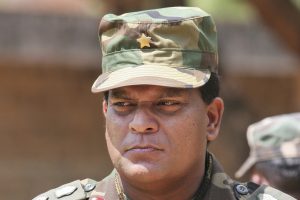Sri Lanka asked the United States on Sunday to review its decision to impose a travel ban on the island nation’s army chief, who has been accused of grave human rights abuses during the final stage of the country’s civil war that ended 11 years ago.
Foreign Minister Dinesh Gunawardena summoned U.S. Ambassador Alaina B. Teplitz to the ministry and formally conveyed Sri Lanka’s strong objections to the travel ban, which he said “unnecessarily complicates the U.S.-Sri Lanka relationship.”
The U.S. government on Friday issued a travel ban on the army chief, Shavendra Silva, saying there is “credible information of his involvement” in human rights violations during the final phase of the war. The ban prohibits Silva and his family from traveling to the U.S.
Sri Lanka has denounced the ban, and on Sunday, Gunawardena reiterated that “there were no substantiated or proven allegations of human rights violations against him (Silva),” according to a foreign ministry statement.
Silva in 2009 was in charge of the 58th Division, which encircled the final stronghold of the Tamil Tiger rebels in the last stages of the civil war that killed at least 100,000 people. Human rights groups have accused the division of violating international human rights laws, including using artillery to shell a hospital, an allegation Silva has denied.
On Friday, U.S. Secretary of State Mike Pompeo said in a statement that “the allegations of gross human rights violations against Shavendra Silva, documented by the United Nations and other organizations, are serious and credible.”
According to a 2015 investigation by the U.N. office of the High Commissioner for Human Rights, near the end of the war, Silva was tasked with capturing Sri Lanka’s Putumattalan area from the Tamil Tigers. The investigation cited evidence that the hospital and a U.N. facility had been shelled.
“Witnesses alleged the use of cluster-type munitions by the Sri Lankan armed forces in their attacks on Putumattalan hospital and the United Nations hub,” the investigation’s report said.
After the war, Silva was promoted to major general. He was promoted again and became Sri Lanka’s army commander last year amid international condemnation, but he is widely respected among Sri Lanka’s ethnic Sinhalese majority.
Pompeo urged Sri Lanka’s government “to promote human rights, hold accountable individuals responsible for war crimes and human rights violations, advance security sector reform, and uphold its other commitments to pursue justice and reconciliation.”
Gunawardena said Silva was appointed army commander because of his seniority and asked the U.S. to verify the authenticity of the sources of information.
Gunawardena said “it is disappointing that a foreign government should question the prerogative of a democratically elected president to call upon persons of proven expertise to hold key positions on national security related matters.”
Sri Lanka declared victory over the rebels in May 2009, ending the Tamil Tigers’ 26-year campaign for an independent state for minority ethnic Tamils. Both the Sri Lankan military and the rebels have been accused of wartime abuses.
The United Nations has said some 45,000 ethnic Tamil civilians may have been killed during the final months of the conflict alone.
Sri Lanka’s government promised the U.N. Human Rights Council in 2015 that it would investigate the allegations against Silva and involve foreign prosecutors and judges, but has not done so.
By Bharatha Mallawarachi for the Associated Press.

































